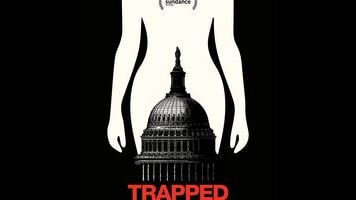The film covers a familiar story, ripped from the headlines. It’s about the escalating fight against abortion, which has seen clinics beset by protestors—and the occasional terrorist—over the past few decades. Trapped’s twist on the topic is suggested by its title. The documentary focuses on the rise in targeted regulations of abortion providers (or TRAP laws) in the conservative legislatures of t states like Alabama, Mississippi, and Texas. Because the decision to terminate a pregnancy remains a legal right in the United States, affirmed by the Supreme Court’s Roe V. Wade decision, pro-life/anti-choice activists have been skirting the courts, by working to make the process incredibly inconvenient and expensive. They’ve moved the hassling of doctors, nurses, and patients from the sidewalks outside the clinics to inside, via byzantine regulations.
Fans of HBO’s Last Week Tonight may already be familiar with Trapped, since the show’s recent segment on TRAP laws featured several excerpts from the film, using Porter’s interviews with doctors and nurses to illustrate the absurdity and inhumanity of some of the new legislation. But Trapped’s talking-head segments aren’t really its strongest. They’re necessary, because people like Dr. Willie Parker and clinic director Marva Sadler can concisely identify and condemn the policies that sometimes have them turning away impoverished teenage victims of sexual abuse. But the heavy reliance on interviews—even as moving as many of these are—at times makes the movie feel like a presentation at a NARAL conference.
It doesn’t help that Trapped is so diffuse, and so loosely structured. Porter follows a small handful of medical professionals across the South, and simultaneously tracks a few stories very important to them, regarding the progress of court challenges to the TRAP laws, and whether those laws will force more clinics to close. But because Trapped keeps bouncing back and forth among these mini-narratives—intercut with more interviews and “day in the life” footage—nothing really emerges as the documentary’s primary arc. As a result, the movie ends abruptly, with the news of one case entering a possibly promising new phase, followed by a more general update and call to action.
That said, there’s real power in the more unobtrusive scenes of Parker, Sadler, and the rest going about their ordinary business, ignoring protestors and treating patients. Porter has made a few documentaries set in the South, and has a feel for the complexities of Southern culture—evident in the shots of nurses praying with patients, and the introduction of a brassy Southern dame who hands out bumper stickers that read, “I Hope Your Fetus Grows Up To Be A Gay Abortion Doctor.” At its best, Trapped removes the controversy over abortion rights from the realm of the theoretical, by spending time with the people the TRAP laws disproportionately affect: the very young, the working poor, and mothers who can’t afford to have any more children.
And while the movie doesn’t give much time to the protestors and politicians, Porter does attempt to expose some of their current tactics—like how they’ve started shouting “Black Lives Matter” at young black women seeking abortions, and how they justify unnecessary medical equipment and procedures under the guise of “protecting women.” At one point, Trapped drops in at a rally for conservative Christian Alabama judge Roy Moore, and lingers over a supporter’s T-shirt that sports a checklist reading “Abortion Is… Murder; Islam Is… A Lie; Evolution Is… A Delusion; Homosexuality Is… A Sin,” and so on. Trapped is hit-and-miss as a piece of filmmaking but effective as an argument, contending not only that some Americans’ rights are being systematically taken away, but that when only a handful of organizations stand up for those rights, they become a bigger target.

 Keep scrolling for more great stories.
Keep scrolling for more great stories.
